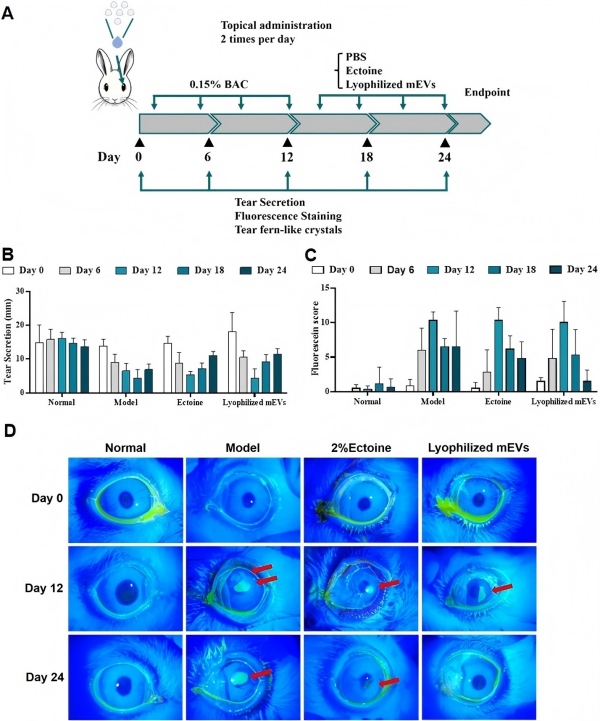Lyophilization Technique Stabilizes Extracellular Vesicles for Effective Dry Eye Treatment
Dry eye disease (DED) is a common condition that affects millions of people worldwide, leading to ongoing eye discomfort and blurred vision. Although extracellular vesicles (EVs) have shown potential as a treatment, their clinical use has been hindered by storage instability. A research team has now developed a new approach using a natural protective agent to improve EV stability.
In a study published in Journal of Controlled Release, a research team led by ZHANG Jiwen from the Shanghai Institute of Materia Medica, Chinese Academy of Sciences used ectoine, a natural stabilizer, to preserve milk-derived EVs (mEVs) through lyophilization (freeze-drying). The lyophilized mEVs significantly relieved symptoms of DED in rabbit models and remained stable for more than two months when stored at 4°C.
The researchers developed an ectoine-enhanced lyophilization protocol for mEVs. Tests showed that a concentration of 1.5% ectoine helped maintain the structural and functional integrity of mEVs. Measurements using fluorescence resonance energy transfer technology confirmed that ectoine-preserved mEVs retained high energy transfer efficiency. Enzyme activity tests further indicated better preservation of biological function in the treated group. After being stored for 60 days at 4°C, lyophilized mEVs kept their size and concentration stable, while untreated vesicles showed significant degradation. In cell experiments, the lyophilized mEVs helped protect human corneal epithelial cells under hyperosmotic stress. The in vivo studies using a rabbit DED model indicated that the treatment with lyophilized mEVs led to better corneal health scores (1.50 ± 1.64) compared to groups treated with ectoine alone (4.80 ± 2.40) or a PBS control (6.50 ± 5.17). Tear secretion measurements also showed that the mEVs-treated group (11.5 ± 1.64 mm) approached normal levels (13.2 ± 2.12 mm), substantially higher than PBS controls (6.00 ± 0.91 mm).
This study offers a lyophilization method to enhance the storage stability of EVs. The protocol supports long-term preservation of EVs function and bioactivity, paving the way for future therapies for DED as well as other ocular surface diseases.

Therapeutic efficacy of lyophilized mEVs in a rabbit DED model.
(Image by ZHANG's lab)
DOI: 10.1016/j.jconrel.2025.114044
Link: https://doi.org/10.1016/j.jconrel.2025.114044
Title: Alleviation of dry eye disease with lyophilized extracellular vesicles
Keywords: Dry eye disease; Extracellular vesicles; Lyophilization; Ectoine; Stability enhancement; Therapeutic efficacy
Contact:
DIAO Wentong
Shanghai Institute of Materia Medica
E-mail: diaowentong@simm.ac.cn




